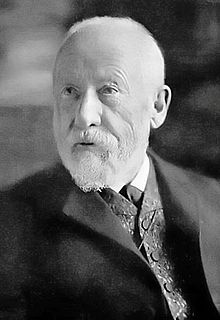In psychotherapy, paradoxical intention is the deliberate practice of a neurotic habit or thought, undertaken to identify and remove it. The concept was termed by Dr. Viktor Frankl, the founder of Logotherapy, who advocated for its use by patients experiencing severe forms of anxiety disorders.
The human condition is "the characteristics, key events, and situations which compose the essentials of human existence, such as birth, growth, emotionality, aspiration, conflict, and mortality". This is a very broad topic which has been and continues to be pondered and analyzed from many perspectives, including those of religion, philosophy, history, art, literature, anthropology, psychology, and biology.
Rollo Reese May was an American existential psychologist and author of the influential book Love and Will (1969). He is often associated with humanistic psychology, existentialist philosophy and, alongside Viktor Frankl, was a major proponent of existential psychotherapy. The philosopher and theologian Paul Tillich was a close friend who had a significant influence on his work.

Man's Search for Meaning is a 1946 book by Viktor Frankl chronicling his experiences as a prisoner in Nazi concentration camps during World War II, and describing his psychotherapeutic method, which involved identifying a purpose in life to feel positively about, and then immersively imagining that outcome. According to Frankl, the way a prisoner imagined the future affected his longevity. The book intends to answer the question "How was everyday life in a concentration camp reflected in the mind of the average prisoner?" Part One constitutes Frankl's analysis of his experiences in the concentration camps, while Part Two introduces his ideas of meaning and his theory called logotherapy.
Existential psychotherapy is a form of psychotherapy based on the model of human nature and experience developed by the existential tradition of European philosophy. It focuses on concepts that are universally applicable to human existence including death, freedom, responsibility, and the meaning of life. Instead of regarding human experiences such as anxiety, alienation and depression as implying the presence of mental illness, existential psychotherapy sees these experiences as natural stages in a normal process of human development and maturation. In facilitating this process of development and maturation existential psychotherapy involves a philosophical exploration of an individual's experiences while stressing the individual's freedom and responsibility to facilitate a higher degree of meaning and well-being in his or her life.
William S. Breitbart, FAPM, is an American psychiatrist who is an international leader in the fields of Psychosomatic Medicine, Psycho-oncology, and Palliative Care. Breitbart, a renowned clinician, researcher, and educator, is the chairman and incumbent of the Jimmie C Holland Chair in Psychiatric Oncology, as well as Chief of the Psychiatry Service, Department of Psychiatry and Behavioral Sciences, Memorial Sloan-Kettering Cancer Center, He is a Professor of Clinical Psychiatry at Weill Medical College of Cornell University. He is a past president of the Academy of Psychosomatic Medicine, and the Editor-in-Chief of Palliative and Supportive Care.
Meaning in existentialism is descriptive; therefore it is unlike typical, prescriptive conceptions of "the meaning of life". Due to the methods of existentialism, prescriptive or declarative statements about meaning are unjustified.. The root of the word "meaning" is "mean", which is the way someone or something is conveyed, interpreted, or represented. Each individual has his or her own form of unique perspective; meaning is, therefore, purely subjective. Meaning is the way something is understood by an individual; in turn, this subjective meaning is also how the individual may identify it. Meaning is the personal significance of something physical or abstract. This would include the assigning of value(s) to such significance.
The will to life or Wille zum Leben is a psychological force to fight for self-preservation seen as an important and active process of conscious and unconscious reasoning. The German philosopher Arthur Schopenhauer was the first to give name to this force.

There are at least two senses in which the term philosophy is used: a formal and an informal sense. In the formal sense, philosophy is an academic study of the fields of aesthetics, ethics, epistemology, logic, metaphysics, as well as social and political philosophy. One's "philosophy of life" is philosophy in the informal sense, as a personal philosophy, whose focus is resolving the existential questions about the human condition.
Self-transcendence is a positive personality trait that involves the expansion of personal boundaries, including, potentially, experiencing spiritual ideas such as considering oneself an integral part of the universe. Several psychologists, including Viktor Frankl, Abraham Maslow, Pamela G. Reed, C. Robert Cloninger and Lars Tornstam have made contributions to the theory of self-transcendence.

The Doctor and the Soul is a book by Dr. Viktor E. Frankl, the Vienesse psychiatrist and founder of logotherapy.

The Unconscious God is a book by Viktor E. Frankl, the Viennese psychiatrist and founder of Logotherapy. The book was the subject of his dissertation for a Ph.D. in philosophy in 1948.
Noogenic neurosis is a term in logotherapy denoting a form of neurosis stemming from "existential frustration". The term was coined by Dr. Viktor Frankl, the founder of logotherapy.

Existential Psychotherapy is a nonfiction book by the American existential psychiatrist and author Irvin D. Yalom.

Paul T. P. Wong is a Canadian clinical psychologist and professor. His research career has gone through four stages, with significant contributions in each stage: learning theory, social cognition, existential psychology, and positive psychology. He is most known for his integrative work on death acceptance, meaning therapy, and second wave positive psychology. He has been elected as a fellow for both the American Psychological Association and the Canadian Psychological Association.
The International Network on Personal Meaning (INPM) is a nonprofit organization devoted to advancing meaning-centred research and interventions. It was founded by Paul T. P. Wong in 1998. Inspired by Viktor Frankl's logotherapy, Wong wanted to expand Frankl's vision to include the contemporary positive psychology movement. Therefore, the INPM provides a "big tent" for both existential-humanistic psychologists and positive psychologists in their biennial International Meaning Conferences and their journal, the International Journal of Existential Psychology and Psychotherapy.







